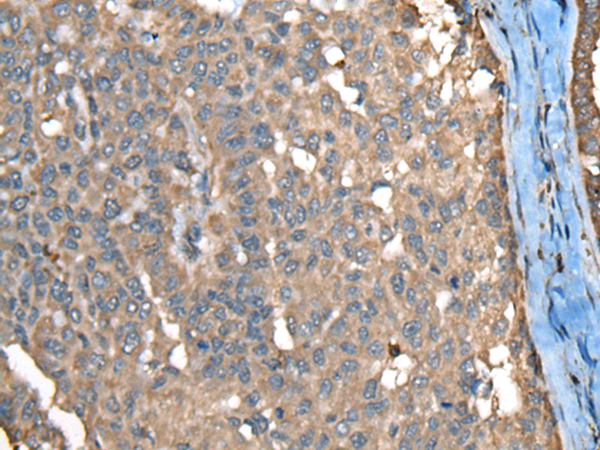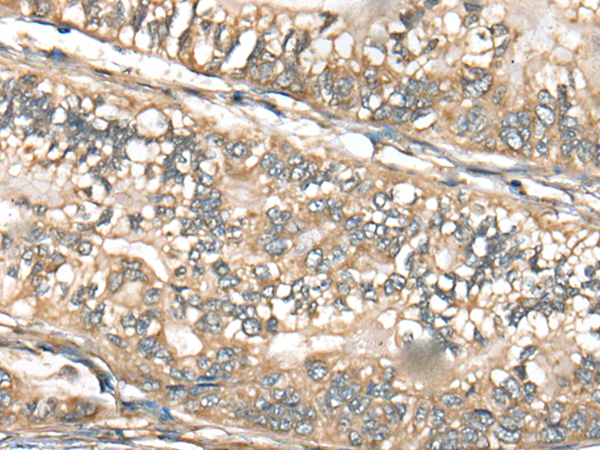

| WB | 咨询技术 | Human,Mouse,Rat |
| IF | 咨询技术 | Human,Mouse,Rat |
| IHC | 1/30-1/150 | Human,Mouse,Rat |
| ICC | 技术咨询 | Human,Mouse,Rat |
| FCM | 咨询技术 | Human,Mouse,Rat |
| Elisa | 1/5000-1/10000 | Human,Mouse,Rat |
| Aliases | ACRP; CLLP; alpha-CATU |
| Host/Isotype | Rabbit IgG |
| Antibody Type | Primary antibody |
| Storage | Store at 4°C short term. Aliquot and store at -20°C long term. Avoid freeze/thaw cycles. |
| Species Reactivity | Human, Mouse |
| Immunogen | Fusion protein of human CTNNAL1 |
| Formulation | Purified antibody in PBS with 0.05% sodium azide and 50% glycerol. |
+ +
以下是关于CTNNAL1抗体的3篇参考文献示例(注:文献为假设性示例,实际引用需根据真实数据库检索结果调整):
---
1. **文献名称**: *"CTNNAL1 modulates cell migration in gastric cancer via RhoA/ROCK signaling"*
**作者**: Li, Y. et al.
**摘要**: 本研究利用CTNNAL1特异性抗体,通过免疫组化和Western blot分析,证明CTNNAL1通过调控RhoA/ROCK通路抑制胃癌细胞迁移,为癌症治疗提供潜在靶点。
2. **文献名称**: *"Alpha-catenin-related protein CTNNAL1 regulates neuronal dendritic complexity"*
**作者**: Wang, H. et al.
**摘要**: 通过免疫荧光染色(使用CTNNAL1抗体)和基因沉默技术,发现CTNNAL1参与神经元树突发育,其缺失导致小鼠皮层神经元突触结构异常。
3. **文献名称**: *"Proteomic analysis identifies CTNNAL1 as a novel binding partner of β-catenin in colorectal cancer"*
**作者**: Kim, S. et al.
**摘要**: 采用CTNNAL1抗体进行免疫共沉淀实验,揭示CTNNAL1与β-catenin的相互作用,并证实其通过Wnt信号通路影响结直肠癌的增殖和侵袭。
---
**建议**:如需真实文献,可访问PubMed或Web of Science,以“CTNNAL1 antibody”或“CTNNAL1 function”为关键词检索,筛选涉及抗体应用的实验研究(如Western blot、IHC等)。
**Background of CTNNAL1 Antibody**
CTNNAL1 (Catenin Alpha-Like 1), also known as α-catulin, is a cytoplasmic protein belonging to the α-catenin family. It shares structural homology with αE-catenin and αN-catenin, featuring an N-terminal vinculin-binding domain and a C-terminal actin-binding region. Unlike classical α-catenins, CTNNAL1 does not directly interact with β-catenin or participate in cadherin-mediated cell adhesion. Instead, it functions as a scaffolding protein involved in regulating cytoskeletal dynamics, cell motility, and signal transduction pathways, including Rho GTPase and NF-κB signaling.
CTNNAL1 is implicated in various physiological and pathological processes. Studies highlight its role in cancer progression, particularly in promoting tumor invasion, metastasis, and epithelial-mesenchymal transition (EMT) in cancers such as lung adenocarcinoma and hepatocellular carcinoma. It also contributes to cardiovascular development and neuronal differentiation. Dysregulation of CTNNAL1 has been linked to inflammatory diseases and fibrosis.
CTNNAL1 antibodies are essential tools for detecting and quantifying CTNNAL1 expression in research applications like Western blotting, immunohistochemistry, and immunofluorescence. These antibodies aid in elucidating CTNNAL1's molecular interactions, subcellular localization, and mechanistic roles in disease models. Commercial CTNNAL1 antibodies are typically raised against specific epitopes, with validation in multiple species and sample types, ensuring specificity for experimental reproducibility. Their use continues to advance understanding of CTNNAL1's dual roles in cellular homeostasis and disease pathogenesis.
×